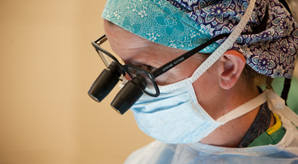

Our goal is to offer you comprehensive surgical care while also providing instruction for our veterinary students, interns, and residents. We collaborate with other areas of our hospital to serve and treat your pet, and our collective knowledge and expertise can be a great advantage for the success of your pet's treatment.
Our surgeries are generally performed by at least a three-person team, including a board-certified faculty surgeon, a resident, and a veterinary student. Our students are always an assistant and are given the opportunity to observe and learn from the work of some of the best veterinarians in the country.
Most surgery patients can expect the following when arriving for their appointment:
For most appointments, you will need to withhold food from your pet for at least 12 hours. Every case is unique, so you should speak to your veterinarian about how to properly prepare your pet for a successful procedure.
You can expect that a trained Anesthesia technician, overseen by a board-certified anesthesiologist, will monitor your pet's anesthetic level, heart rate, EKG, oxygen level, and blood pressure during any procedure.